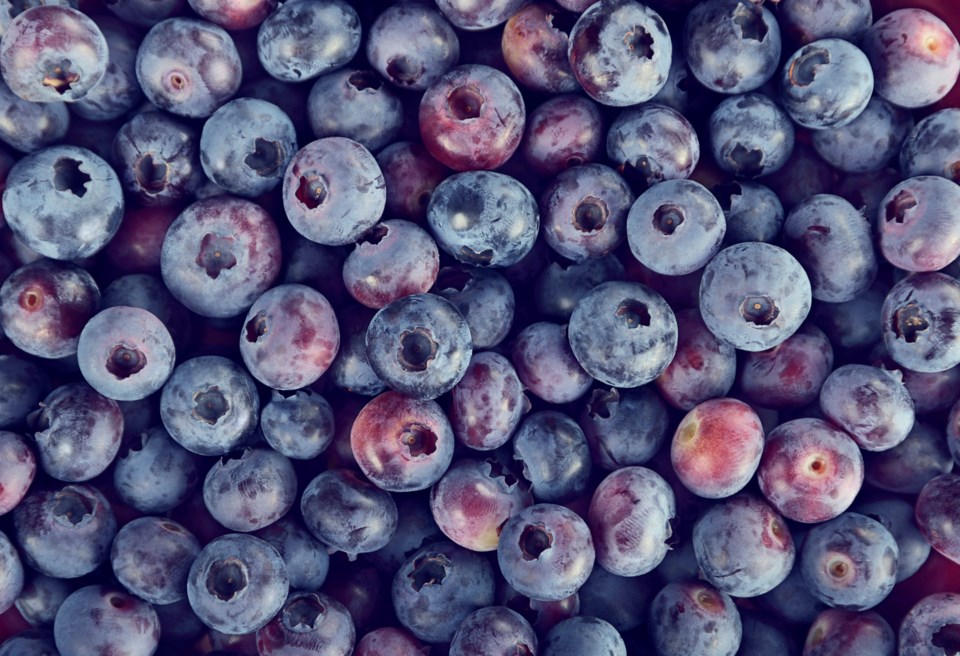It’s summer, and that means bushels of local blueberries have arrived at grocery stores and farmers’ markets near you. Every year there is an overabundance and it’s a great time to stock up and freeze them for the upcoming months. Now I'm sure that at some point you have read why blueberries are all the rage, maybe you read something about antioxidants, or you realized they taste great in smoothies, but there is so much more to know about these delicious little blue morsels of joy.
Blueberries are one of the few fruits native to North America and were enjoyed in abundance by aboriginal people for thousands of years. Native American elders in the Pacific North West would tell of how the Great Spirit sent "star berries" to relieve the children's hunger during a famine (the blossom of each berry forms a perfect five-point star). Medicinally, the leaves were used to make tea thought be a great blood tonic, and the juice was taken to treat coughs and make natural dyes. Today it is still used for medicinal purposes, found in supplement form and as an herbal remedy.
Blueberries grow in a shrub and are part of the heath family, which also include cranberry and willberry (no, not the “Travelling” band) the white-gray waxy "bloom" that covers the surface serves as a protective coating for the berry. Although it is composed of 85 per cent water, blueberries still have the highest antioxidant capacity of all commonly consumed fruits and vegetables. They are also high in fiber, vitamin C and vitamin K and even contain active compounds that reduce cholesterol, lower blood pressure, protect against stroke and reduce oxidative stress. Yes folks, all of this in that tiny blue package.
You can find more information on their benefits in the Harvard Health publications at Harvard medical school.
Not only are these delectable berries convenient and delicious snack, when eaten raw they are more nutritionally dense than baked (but sometimes you just want a blueberry pie, am I right?). So what sort of benefits do these pebble-sized little miracles have? You know, besides turning your tongue blue with delight? There are a lot, let’s take a look at a few:
Digestion
The sodium, copper and acids in the blueberries helps to aid in digestion, while the fiber content helps things go smoothly (pun intended) and prevent constipation. Don’t be alarmed if your poop is a bit blue though, it’s a normal phenomenon that happens when consuming these berries...that are blue.
Brain health
The selenium, B-complex, vitamin A, C and E, copper, and magnesium that are found active in blueberries can prevent and heal neurotic disorders by preventing degeneration and death of neurons, brain-cells and also by restoring health of the central nervous system, all the more reason to make it a part of your daily diet.
Urinary tract health
Cranberry juice isn’t the only answer to a UTI; blueberries have anti-inflammatory properties and contain compounds that inhibit the growth of bacteria that build up in the urinary tract and cause infection as well. If you are familiar with the burning sensation and other unpleasant symptoms of a UTI, get your blueberry consumption in to avoid this painful, annoying infection.
Cholesterol
We have two types of cholesterol, one is bad and one is good. Blueberries have been known to lower the bad cholesterol that leads to cardiovascular disease. They also help to protect the “bad” cholesterol from oxidative damage, which leads to heart disease. Because of its high antioxidant presence and fiber content, the noble blueberry is a great warrior in the fight for heart health.
Recipe:
Breakfast chia blueberry pudding
2 tbsp chia seeds
1 handful of blueberries
1 cup coconut milk
1 mashed banana
1 tbsp of honey
1 tsp ground flaxseed (optional)
1 mason jar
- Put all contents in a mason jar and make sure to stir it well so that the chia seeds are not stuck to the bottom.
- Put in fridge over night and you have an easy awesome breakfast in the morning!



